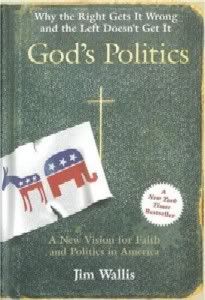WIR -- God's Politics, by Jim Wallis
What I'm Reading. God's Politics: Why the Right Gets It Wrong and the Left Doesn't Get It by Jim Wallis.
A few experpts from the book.
The religious and political Right gets the public meaning of religion mostly wrong--preferring to focus only on sexual and cultural issues while ignoring the weightier matters of justice. And the secular Left doesn't seem to get the meaning and promise of faith for politics at all--mistakenly dismissing spirituality as irrelevant to social change. [page 3]
The real theological problem in America today is no longer the religious Right, but the nationalist religion of the Bush administration, one that confuses the identity of the nation with the church, and God's purposes with the mission of American empire. America's foreign policy is more than pre-emptive, it is theolgically presumptuous; not only unilateral, but dangerously messianic; not just arrogant; but rather bordering on the idolatrous and blasphemous. George Bush's personal faith has prompted a profound slef-confidence in his "mission" to fight the "axis of evil," his "call" to be commander and chief in the war against terrorism, and his definition of America's "reponsibility" to "defend the hopes of all mankind." This is a dangerous mix of bad foreign policy and bad theology.
presumptuous; not only unilateral, but dangerously messianic; not just arrogant; but rather bordering on the idolatrous and blasphemous. George Bush's personal faith has prompted a profound slef-confidence in his "mission" to fight the "axis of evil," his "call" to be commander and chief in the war against terrorism, and his definition of America's "reponsibility" to "defend the hopes of all mankind." This is a dangerous mix of bad foreign policy and bad theology.
But the answer to bad theology is not secularism; it is good theology. It is not always wrong to invoke the name of God and the claims of religion in the public life of a nation, as some secularists say. Where would we be without the moral prophecy of Martin Luther King Jr., who held the Bible in one hand and his Constitution in teh other as he preached, holding us to our best values? Can anyone deny the prophetic leadership of Archbishops Desmond Tutu in South Africa and Oscar Romero in El Salvador? [page 149]
I don't like his writing style -- every paragraph sounds like a sound byte, but his content is very helpful. Be warned, though -- if you consider yourself strongly conservative, you probably won't like the book, you'll probably think he's unfair. He says that he sees a movement growing of likeminded Christians, theologically and morally conservative, but more concerned about social justice than self-righteous sexual purity; more concerned with the poor than with flexing our military muscles. I hope he's right -- I haven't seen a candidate yet, though.
A few experpts from the book.
The religious and political Right gets the public meaning of religion mostly wrong--preferring to focus only on sexual and cultural issues while ignoring the weightier matters of justice. And the secular Left doesn't seem to get the meaning and promise of faith for politics at all--mistakenly dismissing spirituality as irrelevant to social change. [page 3]
The real theological problem in America today is no longer the religious Right, but the nationalist religion of the Bush administration, one that confuses the identity of the nation with the church, and God's purposes with the mission of American empire. America's foreign policy is more than pre-emptive, it is theolgically
 presumptuous; not only unilateral, but dangerously messianic; not just arrogant; but rather bordering on the idolatrous and blasphemous. George Bush's personal faith has prompted a profound slef-confidence in his "mission" to fight the "axis of evil," his "call" to be commander and chief in the war against terrorism, and his definition of America's "reponsibility" to "defend the hopes of all mankind." This is a dangerous mix of bad foreign policy and bad theology.
presumptuous; not only unilateral, but dangerously messianic; not just arrogant; but rather bordering on the idolatrous and blasphemous. George Bush's personal faith has prompted a profound slef-confidence in his "mission" to fight the "axis of evil," his "call" to be commander and chief in the war against terrorism, and his definition of America's "reponsibility" to "defend the hopes of all mankind." This is a dangerous mix of bad foreign policy and bad theology.But the answer to bad theology is not secularism; it is good theology. It is not always wrong to invoke the name of God and the claims of religion in the public life of a nation, as some secularists say. Where would we be without the moral prophecy of Martin Luther King Jr., who held the Bible in one hand and his Constitution in teh other as he preached, holding us to our best values? Can anyone deny the prophetic leadership of Archbishops Desmond Tutu in South Africa and Oscar Romero in El Salvador? [page 149]
I don't like his writing style -- every paragraph sounds like a sound byte, but his content is very helpful. Be warned, though -- if you consider yourself strongly conservative, you probably won't like the book, you'll probably think he's unfair. He says that he sees a movement growing of likeminded Christians, theologically and morally conservative, but more concerned about social justice than self-righteous sexual purity; more concerned with the poor than with flexing our military muscles. I hope he's right -- I haven't seen a candidate yet, though.



